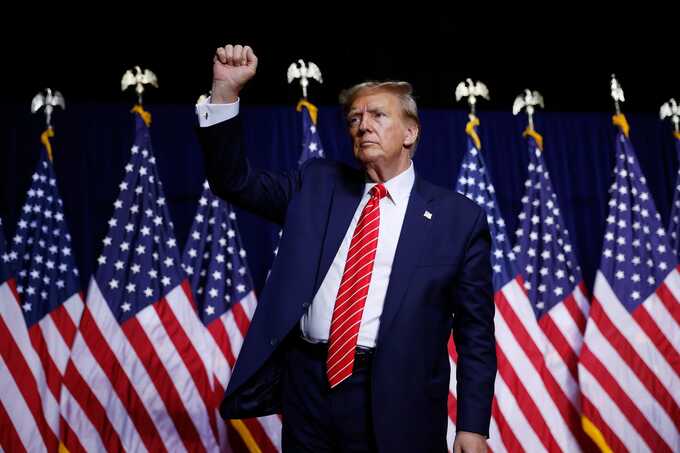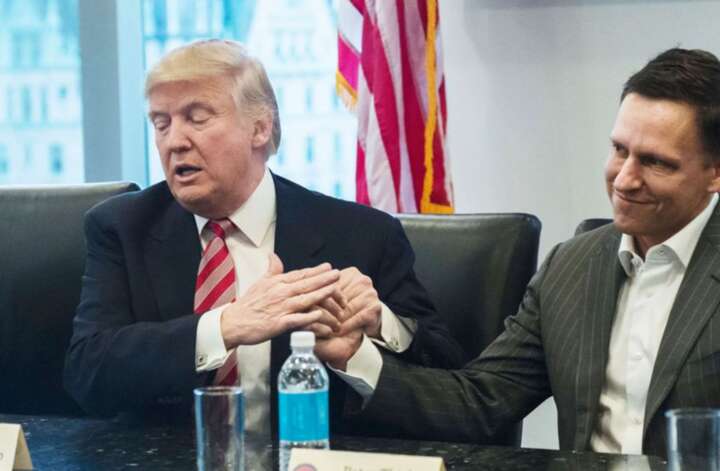

Elon Musk is far from the only American billionaire actively supporting Donald Trump’s bid to return to the White House.
The Republican cause has received tens of millions of dollars in donations from Forbes list entrepreneurs, including from those who formerly shunned politics. Wealthy Americans like the candidate’s promises to cut taxes, legalize cryptocurrencies, and loosen business regulations. However, Trump’s appetite for trade wars could obliterate those benefits should he succeed in becoming president yet again.
Elon Musk has pledged $45 million a month to support Donald Trump’s election campaign. In an interview with the Republican candidate, the billionaire exalted his interlocutor, saying “America is at a fork in the road, and I think you are the path to prosperity, and Kamala is the opposite.”
Trump’s team includes venture capitalists, hydrocarbons tycoons, top executives from large corporations, and many big names from Silicon Valley. In the 2010s, the IT industry was not on the political scene, and founders of large tech companies were more than happy to stay out of politics. The situation changed as the sector grew and pressure on the industry from legislators and consumers increased.
Trump’s program appeals to the wealthy and the corporate segment for several reasons.
Loosen controls, cut taxes: what Trump promises
Trump promises to cut the corporate tax rate from 21% to 20%. “I liked 20% better. I like 15% even better, but I think that would be hard,” he said in a big interview with Bloomberg Businessweek before repeating the message in his conversation with Musk. How do states like Illinois and California even survive with such high corporate taxes, Trump wondered aloud, given that large corporations are purportedly leaving for Republican states because of them?
Cutting regulation in oil and gas production is another item on Trump’s agenda. He plans to restart oil drilling in Alaska’s Arctic National Wildlife Refuge. The additional volumes of crude that would hit the market should lower oil prices, both domestically and globally. Trump’s plans for gas are similar. In 2017, under Trump, Congress lifted the 40-year ban on energy development in the wildlife refuge, authorizing the sale of leasing rights in the resource-rich Arctic zone.
When the Democrats took office, President Joe Biden suspended the Trump-era act and revoked the licenses sold in 2021. Now Trump promises to give them back. He even explicitly requested that a group of oil executives contribute $1 billion to his campaign in exchange for a lower tax burden and less regulation of the industry.
Trump requested that top oil executives donate $1 billion to his campaign in exchange for future tax cuts
Another one of Trump’s stated objectives is to battle inflation, as rampant price growth — caused in part by Trump-era coronavirus pandemic relief measures — is a political liability for the Democrats’ reelection bid. The Republican candidate even attacked the independence of the U.S. Federal Reserve. Trump’s closed-door consultations with a tight circle of advisers have reportedly touched on the possibility of implementing incremental changes in the Fed’s operations in order to give the president a role in the politically independent institution’s decision-making process. However, Trump later denied this, claiming that, “There’s a lot of false information.” Now the candidate says he would let Fed Chairman Jerome Powell finish out his term, “especially if I thought he was doing the right thing.”
At present, Trump strongly supports cryptocurrency, this despite calling BitСoin a “scam against the dollar” as recently as in 2021. “I will stop Joe Biden’s crusade to crush crypto,” he promised. “I will ensure that the future of crypto and the future of BitCoin will be made in the USA, not driven overseas. I will support the right to self-custody. To the nation’s 50 million crypto holders I say this: with your vote, I will keep Elizabeth Warren and her goons away from your BitCoin.” (It’s not entirely clear where Trump got the 50 million from, as the Fed estimates that only about 7% of U.S. citizens, or 18 million people, use cryptocurrency.)
Trump promises to “stop Joe Biden’s crusade to crush crypto”
Aside from votes, Trump regards the crypto industry as a source of funding. And his gamble is paying off: since late May, the Trump campaign has raised more than $25 million in cryptocurrency donations, including large multi-million transfers from crypto billionaires like the Winklevoss twins and Mike Belshe.
Trump’s plans also extend to the real economy, with promises to rescind President Biden’s electric vehicle (EV) policy. Biden intends to increase EVs’ share in new car sales to 50% by 2030 by subsidizing their purchase and imposing emissions limits. Trump has yet to share details of his plan but dismissed the electric car mandate as “crazy.”
A trade war with China is also in Trump’s plans. He and his advisors have discussed imposing tariffs as high as 60% on all Chinese imports. Economists from both parties are unanimous: if this idea comes to life, it would trigger a global trade war, provoking an immediate response from Beijing that would exceed the damage done to the U.S. from previous anti-Chinese sanctions.
Most of Trump’s proposals — tax cuts, deregulation, reducing the cost of money — hit home with entrepreneurs because of the simple capitalist principle of “keep your hands off my business.” Silicon Valley tends to view any regulation as evil, and prominent figures like Andreessen Horowitz venture capital fund co-founder Ben Horowitz argue that modern capitalism should be technology-driven and unconstrained by government or social considerations.
In contrast, Democrats have proposed raising taxes on the wealthy and their companies and eliminating tax breaks for oil production and real estate. The Biden administration claims to have collected “more than $500 million in unpaid taxes from fewer than 2,000 delinquent millionaires, [and] launched enforcement action against 25,000 millionaires who have not filed a tax return since 2017.”
Media resources are more important than money
Trump has long-standing relationships with several billionaires, and their sympathies are not dependent on the Republican candidate’s recent campaign promises. Most notably, this goes for the endorsement from Elon Musk, as well as that of PayPal co-founder Peter Thiel. The latter’s fortune at least doubled during Trump’s presidency, when Palantir, Thiel’s data analysis software vendor, secured a government contract from the Pentagon and its founder gained significant political clout.

Trump and Thiel at the famous meeting with billionaires at Trump Tower on Dec. 14, 2016
Albin Lohr-Jones/Bloomberg
Figures like Musk and Thiel are hostile to progressivism and American democracy itself, which is why they support Trump, writes Robert Reich, a former U.S. Secretary of Labor and professor of political science at the University of California, Berkeley. Musk, for his part, has been sharply critical of “wokeism,” calling it a “threat to civilization.” According to Thiel, the concept of “capitalist democracy” is an oxymoron, and the existence of political rights for the poor — and women — complicates the efforts of self-described libertarians like him.
In addition to generous donations, billionaires like these can offer Trump something even more precious: the support of a broader electorate, such as the American segment of Musk’s 200 million X subscribers. As a platform owner, Musk can manipulate its algorithm to show his posts to the maximum number of users. He is already putting up an average of seven posts a month criticizing Democrats and praising Trump.
The wealthy are holding special meetings where, according to reports, they are discussing how to get Trump back in the White House. In April, Musk and investor David Sacks held a secret dinner for billionaires and millionaires in Hollywood.
This does not mean that America’s business elite is fully united behind the former president. “You can’t say that all business people like Trump. It’s just that Thiel, Musk, and their entourage are very loud on Twitter,” Oleg Itzkhoki, an economics professor at the University of California, Los Angeles, tells The Insider.
Cliff Asness, the billionaire co-founder and fund manager of AQR Capital Management, writes of Nikki Haley that “we could’ve had an articulate adult conservative who has governed very successfully and stood up to the worst of the world at the U.N. as the Republican nominee. But MAGA labeled her a ‘warmonger’ (total bull****, they just repeat their various leaders’ lying talking points) and stuck by their now fully disintegrating dear leader.”
Figures like Asness are far from alone. “I think it reflects the opinion of most business people,” Itzkhoki believes, pointing out that Kamala Harris also has quite a few billionaire supporters. For one, Netflix founder Reed Hastings, who was initially dubious about Harris, still donated $7 million to her campaign. Harris has also been endorsed by LinkedIn co-founder Reid Hoffman, along with Melinda French Gates and George and Alex Soros.
What Trump will really bring to the table
“Take a step back, be honest. [Trump] grew the economy quite well,” Jamie Dimon, chairman and chief executive of JPMorgan Chase, the largest and most profitable bank in the U.S. and one of the most influential in the world, said on the sidelines of the World Economic Forum in Davos, Switzerland, this past January.
Yet while corporate profits and the U.S. stock market indeed grew under Trump prior to the onset of the COVID-19 pandemic, such economic indicators do not necessarily represent the entire economy. For instance, even excluding the crisis year of 2020, Biden comes out slightly ahead in GDP growth, with an annual rate of about 2.9% against Trump’s 2.7%. And the same holds true for job creation.
In June, 16 Nobel Prize-winning economists penned an open letter saying they were “deeply concerned about the risks of a second Trump administration for the U.S. economy.” The economists point to Trump’s “fiscally irresponsible budgets” and cite studies by entities such as the Peterson Institute, Oxford Economics, and Allianz showing that Trump’s program, if successfully implemented, would lead to higher inflation. Rising inflation is already threatening the country, and the Republican candidate’s intention to impose 10% import duties on all goods coming into the U.S. and 60% on goods from China would only exacerbate its effects.
If successfully implemented, Trump’s program will boost rather than lower inflation, experts warn
“If Trump becomes president of the United States, this will mean new trade wars, higher tariffs on imports, and tax cuts. Lowering taxes and loosening regulation is a classic Republican agenda. It increases the budget deficit and, consequently, the national debt. However, this time, the increase in the national debt is expected from both candidates, and its reduction is already a matter of the presidential term following this one,” comments Itzkhoki.
According to the economist, Trump is expanding his traditional agenda by adding import tariff hikes — a proposal not at all characteristic of Republicans, who usually favor free trade. Itzkhoki warns of the likely consequences: “A rate hike would give an additional boost to final prices, which could contribute to inflation, thus slowing the Fed’s rate cut, which would no longer please businesses as much.”
The only silver lining in Trump’s promises is simplifying oil production, which will drive down its price, Itzkhoki said, explaining that “This measure is usually opposed by green transition advocates. But there is no stopping the green transition, regardless of oil price levels. So it is wise to produce and sell more hydrocarbons now since no one will need them soon. In addition, by lowering global oil prices, we can finally reduce Russia’s budget revenues so that it has less money left for the war against Ukraine.”
Source: The Insider